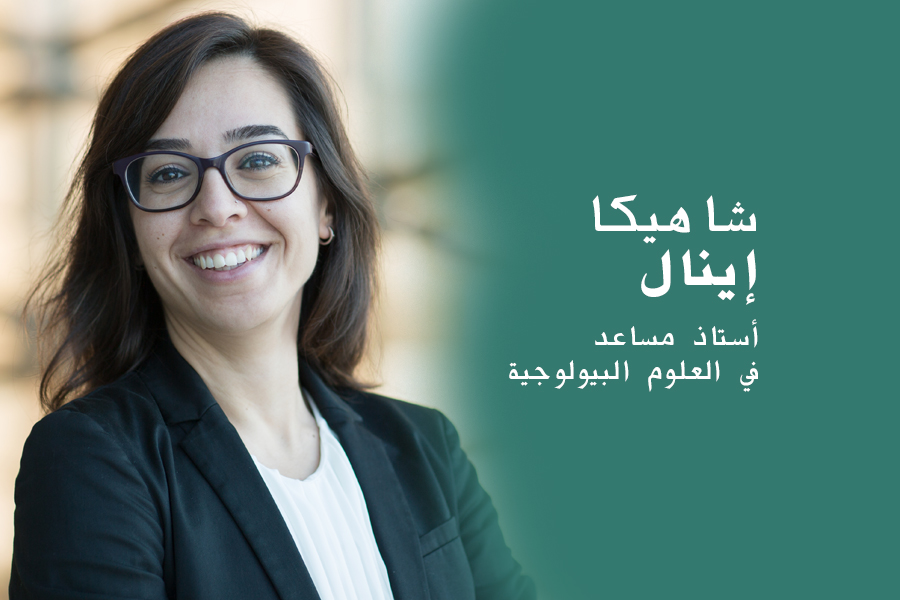Faculty Focus: Sahika Inal

Sahika Inal, assistant professor of bioscience in the University's Biological and Environmental Science and Engineering Division.
Sahika Inal is an assistant professor in the KAUST Biological and Environmental Science and Engineering (BESE) Division. Inal's research focuses on the area of bioelectronics, and her research interests cover organic electronic materials and devices that can address research and clinical health monitoring and therapy needs. Inal started her career in textile engineering at the Istanbul Technical University, and later moved to Germany, where she completed her master’s degree in polymer science in 2009 and her Ph.D. in experimental physics in 2013.
After completing her Ph.D. at the University of Potsdam, she moved to École nationale supérieure des mines de Saint-Étienne (France) to learn about how to design micron-scale polymer-based electronic devices that can interface with living tissue. During her three years of training as a postdoctoral fellow in France, she searched for the next step in her career, leading her to KAUST.
“As a polymer scientist, I was was aware of the world-class scientists at KAUST. Moreover, I was convinced that the facilities and collaborators here and the research environment available in BESE would provide the necessary ingredients for a young scientist to grow, and KAUST was a natural next step,” she said.
Inal, who has been at KAUST since October 2016, is particularly interested in ionic-electronic conduction in organic electronic materials and explores the potential of these materials for recording small biological signals and modulating biological events. At KAUST, she works in close collaboration with chemists and biologists.
“Being at BESE with biologists is truly advantageous for an engineer like myself. As bioelectronics is interdisciplinary, we should work with the medical community to develop devices that can actually have an impact in people's lives. This interdisciplinary field excites me a lot as I get to learn new aspects of biology through these collaborations,” she said.
Inal feels her field of research is full of potential developments and has an exciting future, especially as microfabrication technology continues to advance, the body-machine interface will become more seamless, which will result in more efficient devices that can act as part of the body itself.
“Some fascinating examples are already in the human trials stage, such as implanted devices that can control the function of certain nerves, thereby affecting the state of proteins, cells, tissues and organs. In my opinion, 3-D printing is also going to revolutionize healthcare, as body parts would be created on-demand in short periods of time by machines customized according to the needs of the patient,” Inal noted.
-By David Murphy, KAUST News.
After completing her Ph.D. at the University of Potsdam, she moved to École nationale supérieure des mines de Saint-Étienne (France) to learn about how to design micron-scale polymer-based electronic devices that can interface with living tissue. During her three years of training as a postdoctoral fellow in France, she searched for the next step in her career, leading her to KAUST.
“As a polymer scientist, I was was aware of the world-class scientists at KAUST. Moreover, I was convinced that the facilities and collaborators here and the research environment available in BESE would provide the necessary ingredients for a young scientist to grow, and KAUST was a natural next step,” she said.
Inal, who has been at KAUST since October 2016, is particularly interested in ionic-electronic conduction in organic electronic materials and explores the potential of these materials for recording small biological signals and modulating biological events. At KAUST, she works in close collaboration with chemists and biologists.
“Being at BESE with biologists is truly advantageous for an engineer like myself. As bioelectronics is interdisciplinary, we should work with the medical community to develop devices that can actually have an impact in people's lives. This interdisciplinary field excites me a lot as I get to learn new aspects of biology through these collaborations,” she said.
Inal feels her field of research is full of potential developments and has an exciting future, especially as microfabrication technology continues to advance, the body-machine interface will become more seamless, which will result in more efficient devices that can act as part of the body itself.
“Some fascinating examples are already in the human trials stage, such as implanted devices that can control the function of certain nerves, thereby affecting the state of proteins, cells, tissues and organs. In my opinion, 3-D printing is also going to revolutionize healthcare, as body parts would be created on-demand in short periods of time by machines customized according to the needs of the patient,” Inal noted.
-By David Murphy, KAUST News.

